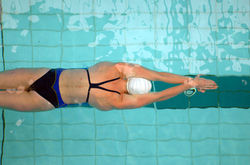SPORTS THERAPY
 |  |  |  |
|---|---|---|---|
 |
Sports Massage is not just for athletes. Anyone who uses their muscles can get an injury. If you like a deep massage that focuses on the areas of pain and tension, then sports massage is for you. Just think of it as injury massage!
Sports Therapy or Sports Massage is specifically concerned with prevention of injury through physical activity and rehabilitation of patients back to optimum levels of functional and occupational fitness. Benefits not limited to athletes and regular sports enthusiasts but to anyone suffering physical discomfort or reduced mobility, regardless of age and ability.
Sports therapy deals primarily with physical problems such as broken bones and sprained muscles through massage techniques, but also concentrates on prevention of recurring injury, through strengthening of the muscles and addressing posture.
Benefits of Sports Massage include, increased flexibility, muscle tone and stability along with improvement in circulation and building of healthy tissue muscle. It is a deeper, more prescriptive massage, which although sometimes painful, is designed to correct injuries and postural issues in order to achieve optimal bio-mechanical functions.
Some of the many medical conditions which can be improved with sports therapy are:
-
Muscular Pain and tension
-
Headaches
-
Ligament and tendon pain
-
Nerve damage and Impingement
-
ME
-
MS
-
Fibromyalgia
-
Chronic fatigue
-
IBS
-
Crohns disease
-
Colitis
-
Arthritis
-
Sciatica
-
Carpal tunnel syndrome
Sports therapy consists of three different types of sports massage. Pre-Event, Post-Event and Maintenance Therapy.
Pre-Event Therapy is part of your warm-up. It reduces muscle tension and decreases the risk of injury. This can be a relaxing or stimulating massage and helps with the listed ailments and can be beneficial pre surgery.
Post-Event Therapy relieves muscle soreness, minimize fatigue and swelling whilst maintaining flexibility and reducing cramping. Post therapy can help with the ailments listed and recovery after surgery.
Maintenance Therapy maintains muscle flexibility, identifies injury prone areas and reduce muscle spasm and pain. Can be completed as often or as little as the patient feels that it is required.
